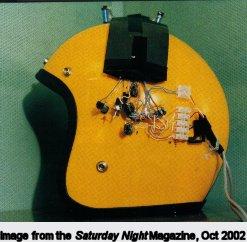 While I'm having my students think about justice--especially retributive justice, meted out vigilantly--I might as well link to this neuroscientific fun:
While I'm having my students think about justice--especially retributive justice, meted out vigilantly--I might as well link to this neuroscientific fun: Previous brain imaging studies have revealed that part of the frontal lobes known as the dorsolateral prefrontal cortex, or DLPFC, becomes active when people face an unfair offer and have to decide what to do. Researchers had suggested this was because the region somehow suppresses our judgement of fairness.If you see any used car salesmen pacing the lot, carrying strange looking helmets, run.
But now, Ernst Fehr, an economist at the University of Zurich, and colleagues have come to the opposite conclusion – that the region suppresses our natural tendency to act in our own self interest.
They used a burst of magnetic pulses called transcranial magnetic stimulation (TMS) – produced by coils held over the scalp – to temporarily shut off activity in the DLPFC. Now, when faced with the opportunity to spitefully reject a cheeky low cash offer, subjects were actually more likely to take the money.
Update: The Times has a slightly different take.
When the right DLPFC is shut down, the way they play starts to change. When given a low offer, they still feel it is deeply unfair. But, instead of rejecting it as they usually would, their selfish, ultra-rational side wins out over their emotional reaction against the other player’s meanness. They accept any amount of cash, however small.
The implication is not that the DLPFC is generating a sense of injustice — that was still there even when the region was knocked out. Rather, it seems to be more like an executive decision-maker, balancing the claims of emotion and reason.
“It is as if it is the referee that enforces fairness, and overrides narrow self-interest,” said David Laibson, Professor of Economics at Harvard University.
No comments:
Post a Comment